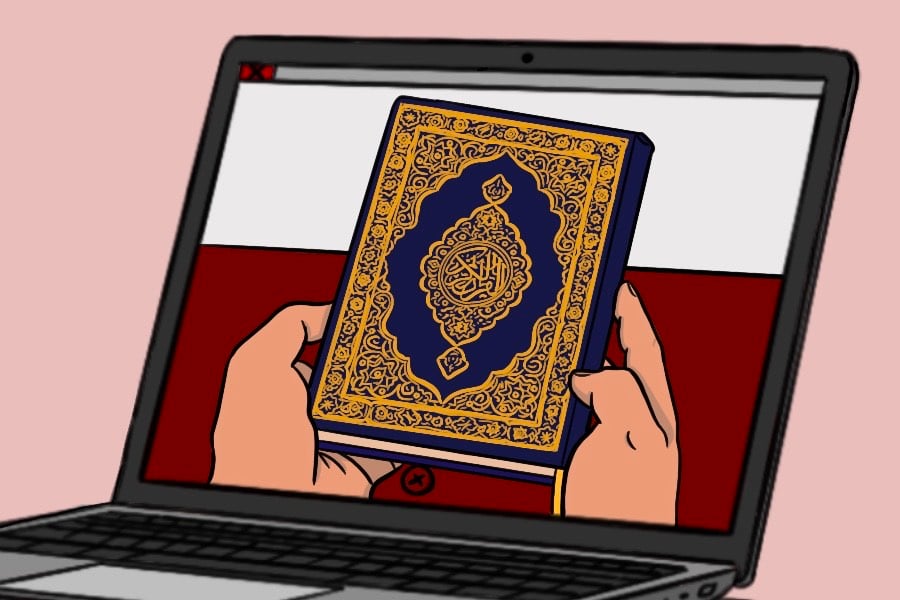Students celebrate Ramadan during pandemic
Muslims across the world are celebrating the holy month of Ramadan from sundown on April 23 through May 23. This year, Northwestern is providing resources to students, as they adapt their practices amidst the COVID-19 pandemic.
May 3, 2020
From sundown on April 23 through May 23, Muslims across the world are celebrating the holy month of Ramadan. This year, however, their observation looks different.
Throughout the 30-day holiday, communities normally partake in different rituals and traditions which include fasting and praying. Chaplain Tahera Ahmad, Northwestern’s director of interfaith engagement, said the pandemic has presented challenges to observing and forced students to adapt to the present circumstances.
“Ramadan is a very special time for Muslims, but this one is going to be different,” Ahmad said. “But solitude can spark contemplation, and that’s not a bad thing to think about during the holiday.”
Ahmad said during Ramadan, people cleanse themselves both physically and spiritually. She said most Muslims fast from food and drinks during the holy month from dawn to sunset each day.
Ramadan is also about building relationships, and Ahmad said an important aspect is community. People usually break their fasts — a meal called iftar — with family and friends. Due to the pandemic, however, gatherings are not permitted, which Ahmad said has become a challenge.
Communication sophomore Tessneem Shahbandar, co-president of Northwestern’s Muslim-cultural Students Association, echoed those sentiments. She said the hardest part about celebrating Ramadan during the pandemic is the decreased community aspect of the holiday. Shahbandar said she wishes she could break fast with her community and pray together.
“Usually Ramadan is all about unity and cohesion,” Shahbandar said. “It’s definitely been difficult in that respect, especially for people who lack a strong community at home.”
Northwestern offers free iftar meals that Muslim students living on or near campus can pick up every day from 5-8 p.m. Ahmad said she commends the University for providing students with funds and resources they need during Ramadan, especially because she doesn’t know of any other institution doing the same.
“You can’t underestimate how much this means right now to Muslim students,” Ahmad said. “They can’t come together, but they are being provided support in other ways.”
Ahmad pointed out that of the Muslim students who are currently living at or near NU, many are international students. Ahmad said they’re facing a “double whammy.”
Many of these international students cannot fly back to their respective home countries due to current travel restrictions, preventing them from celebrating Ramadan with their families , Ahmad said. These students, Ahmad added, are likely living alone if they’re still in Evanston.
Because Muslim students, faculty and staff cannot be together on campus, Ahmad leads a halaqah, a prayer service, every Friday at 5 p.m through Zoom.
Ahmad said the virtual halaqah is less structured than it would be in person. Those who attend the Zoom meeting check in on each other and casually talk. Furthermore, a group Quran reading is held every day at 5 p.m. and individual Quran readings are scheduled with Ahmad starting at 10 p.m.
In addition to support from Ahmad and interfaith engagement, McSA is hosting meetings and planning virtual events. Shahbandar said the group wants to remind people of the beauty of the holiday and create a sense of normalcy for members.
“We really just want to make sure everyone’s okay,” Shahbandar said. “During this crisis, people have feelings of isolation, but we are available to anyone who needs us.”
McCormick sophomore Abdalla Badri, McSA director of public relations, said he misses celebrating Ramadan with his campus community. Spending the holy month with McSA last year, he said, made the holiday even more special.
While he can’t physically be with his fellow McSA members, Badri said it’s comforting to see them online. He said spending time together over Zoom is much better than he expected it to be, and has been a helpful resource during the holy month.
“It’s better than nothing,” Badri said. “I think we all feel lucky to have each other.”
Email: [email protected]
Twitter: @zoermalin
Related stories:
–Students adapt to celebrate Easter, Passover during the pandemic
–Students connect with faith communities virtually as COVID-19 moves worship online












